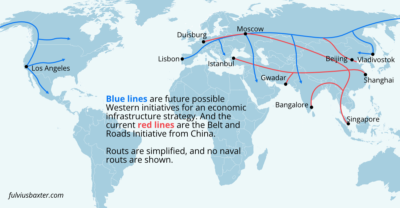 We have long had lockdowns, where cultural and political barriers have created divisions between countries and their respective economies. Such a division existed between East and West, or between Germans and Slavs, British and French, Danes and Swedes, etc.
We have long had lockdowns, where cultural and political barriers have created divisions between countries and their respective economies. Such a division existed between East and West, or between Germans and Slavs, British and French, Danes and Swedes, etc.
Today, it is East Asians, Arabs and Africans who are seen as ‘the other’, and to some extent Latin Americans and Indians. Their culture is different from the European one, which is dominant in Europe, Russia and North America; these countries have more opportunities for natural alliances.
Now that President Joe Biden is gone, we see a natural reconnection between the US and Russia, they are already repairing diplomatic contacts, and a natural consequence is the lifting of sanctions. For the US it is important that trade is done in dollars, and for Russia the trade itself is important, as well as peaceful relations with the US.
Imagine if the Trans-Siberian railway continued across the Bering Strait to Alaska, through Canada and all the way down to Los Angeles. It’s a dizzying thought, but plans are already in place, and it would be a win-win for both sides.
With China’s successful Belt and Road Initiative, we realise the importance of trade infrastructure across the globe. Even President Putin mentioned this early in his career, proposing a free trade zone from Lisbon to Vladivostok, which would have been a great opportunity for us Europeans. The gas pipelines between Russia and Germany are also part of such long-term strategic thinking.
These grand ideas, which could bring us so much success and wealth, are rarely realised. The problem is that the grand plans often exclude one or the other party. Trade routes between the United States and Russia across the Bering Strait would to some extent exclude Europeans. And the free trade zone between Lisbon and Vladivostok would exclude the Americans and partly the Chinese.
It is therefore a popular idea among geopolitical analysts to accuse the great powers of sabotaging each other’s attempts at rapprochement. And this was probably evident under Biden and his treatment of Europeans and Russians. One can even see the war in Ukraine as a devastating chess move aimed at creating irreparable divisions across Eurasia.
Now, with the war in Ukraine in its final stages, there is a unique opportunity to start something new. The West and NATO lost to the Russians, although it will not be portrayed that way in the media, but the Russians prevailed against the combined military and economic efforts of the West. That is the reality, and Russia came out of the conflict stronger, while the European and American economies suffered.
The US strategy seems to be to end the war quickly, and let the Europeans continue if they want, but on their own. This partly blames Europe for the conflict, as the US will be the one pulling out, not the one directly involved, border to border. The US is safely across the Atlantic, far from Ukraine. If the Europeans continue the conflict on their own, they are trapped, and may end up taking all the blame, as time goes on. And their armies are not at all equipped to take on Russia’s combat experience and huge army.
Europe should disengage as quickly as possible, and begin diplomacy with Russia. With a bit of luck, the gas pipelines can be repaired and restarted relatively quickly, and we can save parts of Germany’s economy, which, as we know, is the engine of Europe. Without Germany, we are nothing, just a bunch of chattering know-it-alls. And if Europe doesn’t understand the new order, there will be divisions, the Central European countries will turn tail and ally themselves with the BRICS countries, with whom they are already on good terms. And we will have an isolated, migrant-ravaged and divided Western Europe, which could take decades to repair, if at all.
The key to how Europe evolves is Germany, and the upcoming elections. It’s not surprising that US politicians are reaching out to German counterparts who want to end the war and re-engage with Russia. The Trump administration wants to bring Europe on board, and cautiously approach Russia; it is certainly possible to interpret the situation that way. So is Vice President J.D. Vance’s harsh rebuke of cultural unity, and respect for core Western European traditions like free speech. European-Russian-American unity would be good for all of us, and would put the brakes on China’s ideas of world economic dominance, and all those who support China’s ambitions.







